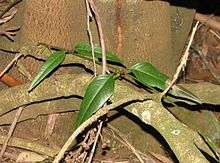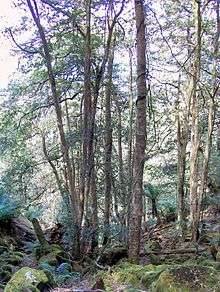Parsonsia brownii
| Parsonsia brownii | |
|---|---|
 | |
| Parsonsia brownii, Sherbrooke Forest, Victoria | |
| Scientific classification | |
| Kingdom: | Plantae |
| (unranked): | Angiosperms |
| (unranked): | Eudicots |
| (unranked): | Asterids |
| Order: | Gentianales |
| Family: | Apocynaceae |
| Genus: | Parsonsia |
| Species: | P. brownii |
| Binomial name | |
| Parsonsia brownii (Britten) Pichon[1] | |
| Synonyms | |
|
Lyonsia brownii Britten | |
Parsonsia brownii, commonly known as twining silkpod or mountain silkpod, is a woody vine of the dogbane family, Apocynaceae.[1][2] It occurs in rainforest in the states of New South Wales, Victoria and Tasmania in Australia.[2]
Description
The species climbs to 10 or more metres in height and has a watery sap.[2][3] The glossy leaves are lanceolate, up to 20 centimetres long and 4 centimetres wide, and taper towards the tip.[3] Juvenile leaves are narrower and new growth is down-covered. Small, sweetly scented yellow and brown flowers are produced in loose terminal panicles between August and December.[3] These are followed by long, slender pods which are 5 to 10 centimetres in length.[2]
Taxonomy
The species was first formally described as Lyonsia brownii by botanist James Britten in Journal of Botany, British and Foreign in 1907.[1] The species was placed in the genus Parsonsia by French botanist Marcel Pichon in 1950 in Notulae Systematicae.[1] The names Lysonia straminea and Parsonsia straminea have been misapplied to this species in the past.[1]
Cultivation
The species is not commonly cultivated and is considered too vigorous for most gardens.[3] It requires cool, moist conditions.[3] Plants are commercially available from local indigenous plant nurseries.[3]

References
- 1 2 3 4 5 "Parsonsia brownii". Australian Plant Name Index (APNI), IBIS database. Centre for Plant Biodiversity Research, Australian Government, Canberra. Retrieved 2009-05-31.
- 1 2 3 4 "Parsonsia brownii". PlantNET - New South Wales Flora Online. Royal Botanic Gardens & Domain Trust, Sydney Australia. Retrieved 2009-04-13.
- 1 2 3 4 5 6 "Yarra Ranges Shire Council Yarra Ranges Local Plant Directory". Retrieved 19 January 2014.